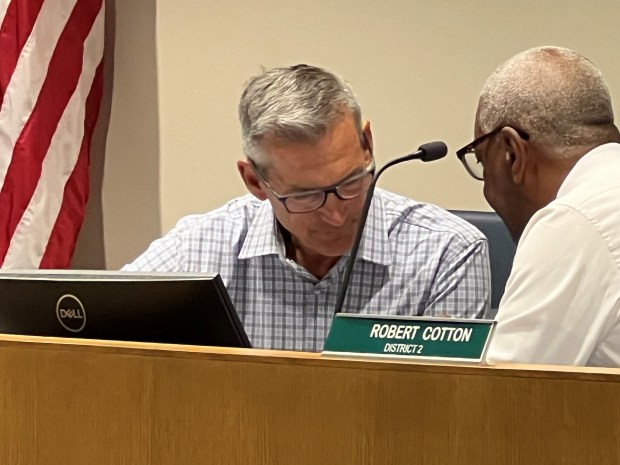Valparaiso City Council President Robert Cotton and council constituents are at odds with Valparaiso Mayor Jon Costas about the passing of “amended text” unified development ordinances, citing what Cotton calls “blended ordinances approval” that could result in restrictive discussion and confused contemplation before the voting process.
The catalyst for the debate was sparked by a discussion about an ordinance presented by Valparaiso City Planner Beth Shrader at the July 22 meeting. The ordinance, which included a public hearing, addressed changed text related to two different city matters: stormwater drainage and a future modification of zoning for the fraternities at Valparaiso University.
“The unified development ordinance is a local document we use for our sets of standards and regulations,” Shrader explained during her presentation.
“Tonight’s proposed ordinance is about three main topics: stormwaters, the best locations for fraternities and sororities at VU, and non-conforming uses for lots…This is massive and our changes we will be bringing to you amount to more than 550 pages, with tonight’s changes only representing about 50 of those changes.”
Cotton called a point of order, asking for each revision to be considered as a separate motion rather than “lumping them all together for approval” and describing them “each as different characteristics and better to be separate amendments.”
Council member Barbara Domer, D-3 agreed with Cotton, D-2, and offered to back a motion to separate each of the amended topics by subject.
Mayor Costas firmly advised the council to not separate the amended text into multiple ordinances, fearing it would “interfere with the process.”
“This (proposed ordinance) has already been through the entire process of the plan commission,” Costas said in rebuttal.
“I’m just saying we have 550 pages to go through. And to some degree, we have to give our professions a certain degree of deference. There are 34,000 people who are not here tonight and they trust us to make good decisions. We can’t go knocking on every door and asking people what they think about this. We have public comment and we take that in consideration. I’ve had several meetings myself with fraternities about these issues. We can make everybody happy.”
Shrader said working with Valparaiso University and the campus master plan, the new amended text better suits future planning for the university and property owners who live near the campus.
“There’s a wide geography of residential transition zones around the campus,” Shader said.
“What was once a single-family home could now find that is suddenly a house with 25 students living in it.”
Shrader clarified that the amended text would not force any existing fraternity or sorority to close or move. However, in the future, any new Greek student life organization coming to campus or building or opening a new living space would be located on campus rather than in the surrounding residential neighborhood.
During the public hearing, resident Jennifer Hohl, of the 100 block of Greenwich Street, said for the past half-century, her family has lived near the Valparaiso University campus in the house that was once used as the home for former Valparaiso University President H. T. Dau during the 1920s. She spoke in support of the amended ordinance and described the decades of disturbances from students and fraternities her family has endured.
“Some years, students cause very little disruption, while others, sometimes starting in October we already start counting down the days until graduation,” Hohl said.
“Currently, there is one fraternity without an official house and they are on the 400 block of Monroe Street. The students call this the ‘fun house’ because of the parties. We have students urinating in our yards, having sex and stealing street signs while there are loud parties with music playing until all hours of the morning. My family strongly urges you to approve this ordinance change.”
Two other residents spoke, both describing the positive attributes and community service fraternities and sororities provide.
Both Domer and Cotton said they thought there would be greater public comment on the ordinance topics if they were addressed independently. With guidance from Valparaiso City Attorney Patrick Lyp, Cotton motioned for all of the suggested ordinance test amendments to be tabled until the next meeting, Aug. 12, to allow for further public input and discussion, and the council voted unanimously in support.
Philip Potempa is a freelance reporter for the Post-Tribune.





